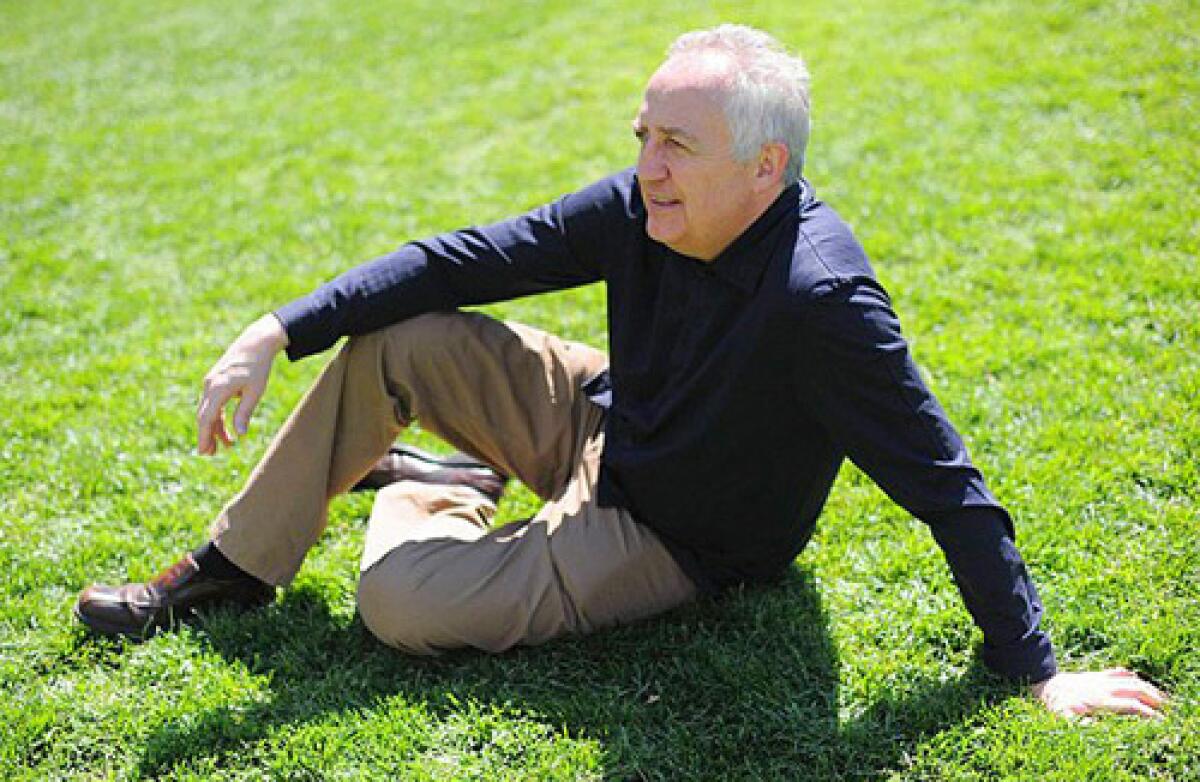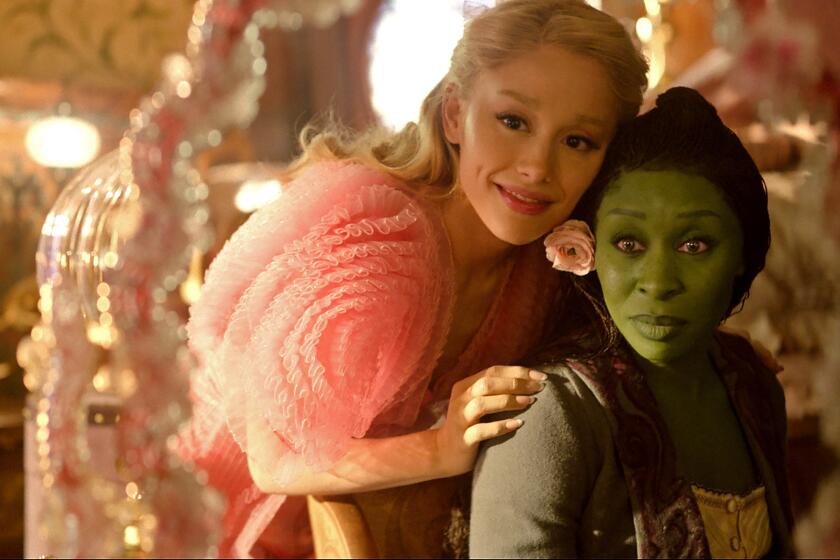Bramwell Tovey mixes a mean musical cocktail

Reporting From New York — — It’s tempting to call Bramwell Tovey the Noel Coward of conductors.
In the past decade the native Brit has become renowned for his droll and witty remarks from concert stages.
In June, as host of the New York Philharmonic Summertime Classics series, Tovey guided the orchestra through a dramatic, seductive performance of pieces from the ballet score “Raymonda” by Russian composer Alexander Glazunov.
After the applause came to a rest, Tovey faced the full house at Avery Fisher Hall and offered his opinion of Glazunov, a contemporary of Tchaikovsky, Mussorgsky and Prokofiev.
“I think he was right at the top of a second-class act,” Tovey said.
The audience broke out in laughter.
Still, Noel Coward isn’t quite the right comparison for Tovey, who returns Tuesday for his third summer as principal guest conductor of the Los Angeles Philharmonic at the Hollywood Bowl.
Yes, Tovey is urbane and wears his learning lightly. It’s just that his elegance comes out in his conducting and not his, well, look.
On a June afternoon in Manhattan, seated in an old-world Italian cafe, the portly Tovey, 57, was wearing brown corduroys and a brown shirt with a zipper that ran up the collar. Actually, the shirt was kind of stylish.
There was no mistaking, though, his inner rumpledness.
Tovey has a cheerfully big head that appears to sit directly on his shoulders. His nose juts outward and drops abruptly south, like a broken rooster beak. An inveterate cricket player, Tovey has taken one too many balls to the face.
“How would I describe myself?” Tovey said, thinking for a moment. “Cosmetically challenged.”
Tovey enjoys his reputation as the witty bloke whom everybody loves to gather around at the pub. It’s not an act. It’s who he is.
At the same time, his Falstaffian image overshadows a fascinatingly diverse musician, a champion of contemporary music and a composer himself who writes in surprisingly dark and unflinching tones.
“I’m just this whole cocktail,” he said.
Tovey grew up in a modest home in East London. He descended from a long line of Salvation Army evangelists who spread the Protestant word with the fire of the Holy Ghost and the sound of brass bands.
Tovey played the piano, tuba and violin by the time he was a teenager.
Hs father, a World War II vet, always wanted be a professional musician, yet lived out a melancholic life as an accountant for a jewelry company. He died of cancer when Tovey was 15.
Nobody laid out a red carpet for Tovey to enter the privileged world of art. He made it on his own street talent and smarts. The artful dodger became the conductor who could lead anybody to classical music.
In the restaurant, maybe because Kelsey Grammar was sitting a few tables away from us, our conversation veered to the surreal world of celebrities. Tovey recalled his first brush with fame.
At home in London one morning in the late ‘70s, Tovey picked up the Daily Star and saw a huge photo of the “lovely” flute player he dated a few times when they both attended the Royal Academy of Music. He wondered what happened to her.
Quite apparently, he explained, “she had run off, joined a rock band and built a singing career.” Now here she was in bold type in one of England’s storied tabloids: Annie Lennox.
“My wife is a huge Annie Lennox fan,” he continued. “When I told her I went out with Annie, she said, ‘Did you sleep with her?’ I said, ‘No!’” Disappointed that Tovey didn’t have a good coda for his story, his wife, Lana, a Canadian music educator, said to him, “Why not? What’s wrong with you?”
Tovey has lived in Canada for more than two decades. In the ‘80s, while on tour in Canada with a British ballet company, he formed a chain of lasting relationships. Beginning in 1989, he served as the music director of the Winnipeg Symphony Orchestra for 11 years. Since 2000, he has been the music director of the Vancouver Symphony.
While Tovey is best known in the U.S. for his summer gigs with the L.A. Philharmonic and the New York Philharmonic, generally conducting crowd pleasers such as Tchaikovsky’s “1812 Overture” — which he will do for two nights at the Hollywood Bowl — he is celebrated in Canada as the consummate raconteur.
“In Winnipeg, Bramwell was a superstar,” said Glenn Buhr, a Canadian composer and pianist, who has worked with Tovey for 20 years. “He was the most famous person in the city. I’ve never seen anything like it.
“Everybody — politicians — wanted to know him. Even in Vancouver, he’s at the top of the fame game.”
Buhr, whose piercing, tranquil work “Winter Poems” is often performed by the Vancouver Symphony, called Tovey “as good as any conductor in the world right now.” He underscored the typical first impression of him.
“When I first met Bramwell, I thought of him as a party animal,” Buhr said. “I hadn’t been to rehearsal with him yet, and I thought, ‘Oh, this is going to be fun, he’s just going to joke around.’
“But he walked in and he was very strict. He never let the orchestra out a second early. He always had something more for them to do. He’s an impeccable musician.”
In 1990, Tovey and Buhr launched a new music festival in Winnipeg, featuring both local and international composers. (“ Arvo Part writes very beautiful music,” Tovey said. “But he tinkers with it constantly. He’s quite frustrating to have around.”)
It was the force of Tovey’s personality, Buhr said, that broke down the barriers that typical classical music subscribers erect to new music and earned the festival a wide audience. “Bramwell can sell anything from the stage,” Buhr said.
Tovey’s commitment to new music is seen plainly in his own compositions, which he works on every morning from 6 to 9.
Influenced by the hard-edged Romanticism of his beloved countryman Frederick Delius, Tovey often finds his voice in dire currents. In 2003, he won a Juno, Canada’s Grammy, for classical composition of the year for “Requiem for a Charred Skull,” a searing work for choir and brass band. As Tovey explained, the work was inspired by his disgust at England’s lavish “millennium” celebration in 1998, when it dumped $2.5 billion into a “ridiculous” exhibition dome. “At the same time, there was genocide in Serbia. There was nothing to celebrate.”
Tovey’s fidelity to his art hit the public airwaves in December 2009 with an impact seldom felt by classical music. The Vancouver Olympics’ organizing committee asked Tovey to record Barber’s “Adagio for Strings” for the opening ceremony. Thing was, the performance would be credited to Tovey and the Vancouver Symphony, but would be mimed on stage by another telegenic conductor and orchestra.
No go, Tovey responded to the committee, he wouldn’t record it. “It was awkward to begin with,” he said. “It’s an iconic American piece for a Canadian opening ceremony. And when I was told another conductor would mime it, I said, ‘That’s dishonest. Get somebody else to do it.’” The committee did, though later publicly apologized.
The range of Tovey’s talents will be on display at the Hollywood Bowl — good news for audiences and the L.A. Philharmonic itself. “The orchestra loves working with him,” said Deborah Borda, president and chief executive of L.A. Phil.
For years, Tovey had conducted the occasional concert with the orchestra. So when Leonard Slatkin’s run as guest conductor at the Hollywood Bowl ended in 2007, Borda said, Tovey was the unanimous choice to replace him.
While Tovey’s eight upcoming programs lean toward popular works by Beethoven and Brahms — one night will be consumed by Leonard Bernstein’s operetta “Candide” — the Sept. 7 evening will spotlight one of Tovey’s own works, the jubilant “Urban Runway,” his lampoon of the high fashion world.
Our conversation turned back to Canada. For some reason, I said, it was difficult to imagine the true Brit fully at home in Canada.
“I do feel slightly stateless,” Tovey said. “I love Canada. And I am Canadian. But when I walk out on top of Malvern Hills in England, where Elgar used to go, and come down and have a pint of bitter at the pub, I think that’s when I feel most at home.”
More to Read
The biggest entertainment stories
Get our big stories about Hollywood, film, television, music, arts, culture and more right in your inbox as soon as they publish.
You may occasionally receive promotional content from the Los Angeles Times.










